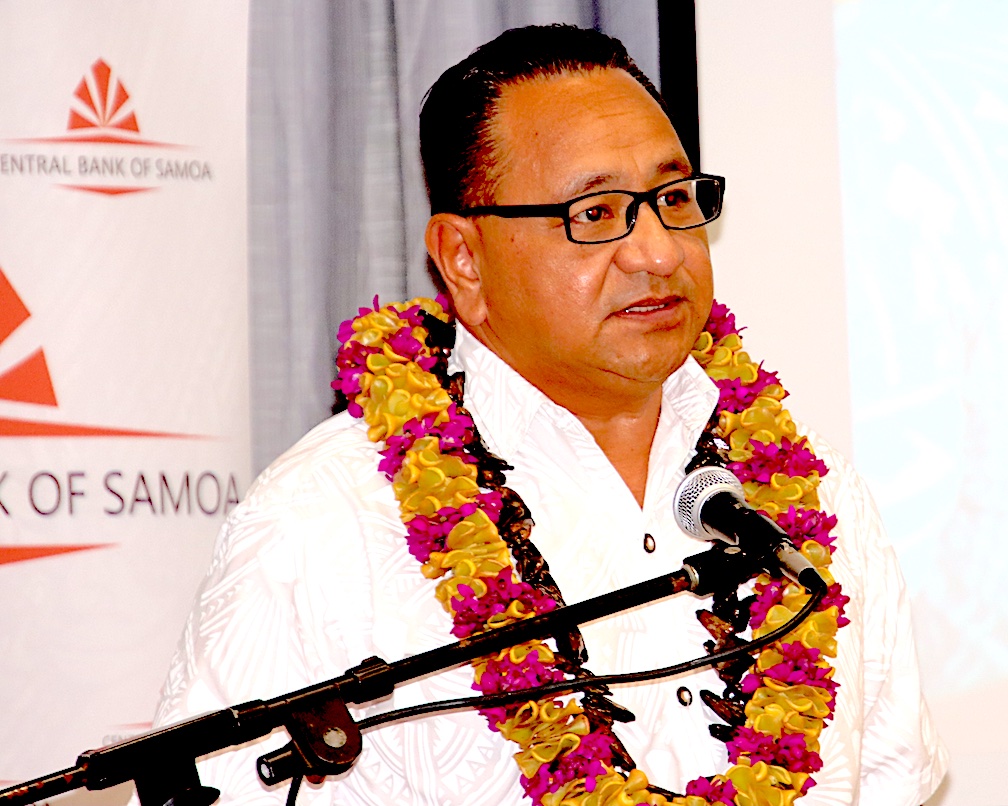
Launch of National Financial Inclusion Strategy 2.0 and
Digital Financial Literacy Survey report.
Taumeasina Island Resort Tuesday 14th November 2023
Salutations
- Rev. Iese Uele
- New Zealand High Commissioner to Samoa, Your Excellency Trevor Matheson
- Australian Acting High Commissioner to Samoa, Mr. Greg Furness
- UN colleagues, donor partners and partners from the private sector and civil society
- Distinguished guests, ladies and gentlemen,
- It gives me great pleasure to address this important gathering here to celebrate a significant milestone in Samoa’s financial inclusion journey – the launch of the Second National Financial Inclusion Strategy (NFIS2) and the Digital and Financial Literacy Survey Report for Samoa
- The journey leading up to the formulation of NFIS 2 had been one of introspection, evaluation, and collaboration. Building upon the successes and challenges of the first national strategy, we embarked on a rigorous process. Through consultations with government entities and private sector partners, many of them in the room today, we gathered invaluable insights and reflections.

1 These conversations, marked by diverse perspectives and shared aspirations, have shaped the strategic pillars and enablers outlined in NFIS 2.
- The Second National Financial Inclusion Strategy (NFIS2) is not just a strategic document; it represents our vision for a financially inclusive Samoa.
- It lays the foundation for a resilient financial sector that ensures universal access to diverse, affordable, and responsible financial services. This vision goes beyond individual empowerment; it resonates with the core of our government initiatives and drives progress across key sectors of our economy.
- As Samoa continues to thrive and diversify its economy, the need for responsive and responsible financial services becomes increasingly apparent. However, it is equally important for our citizens to embrace their roles as responsible economic actors.
- The Digital and Financial Literacy Survey Report for Samoa, is a comprehensive survey, undertaken by the UN Capital Development Fund and Tebbutt Research, and provides invaluable insights into the digital and financial literacy landscape of Samoa. This is a key deliverable under the Vibrant Digital Financial Ecosystem strategic pillar of NFIS 2, that encourages innovative technologies that can cultivate an ecosystem where businesses can thrive, and individuals can transact securely and conveniently.
- Our National Financial Inclusion strategy places a special emphasis on vital sectors such as agriculture and micro, small, and medium-sized enterprises (MSMEs).
- Approximately 42% of our population is engaged in agriculture, and thousands of businesses contribute to our economy through the MSME sector. NFIS 2 focuses on providing these sectors, with access to formal financial services, empowering them to expand, invest, and innovate. By strengthening financial inclusion within these sectors, we are not only supporting economic growth but also ensuring the livelihoods of many Samoans.
9. Embracing digital technologies and digital financial services also hold great potential for our remittances sector, which is a vital source of income for our country, accounting for at least 30% of our GDP. More than half of which come from families abroad especially in New Zealand and Australia. Samoans, like many Pacific Islanders, have long faced obstacles when it comes to sending and receiving money across borders such as high transaction fees and limited financial service access points making even basic financial transactions challenging. Equipping our people with the right knowledge and well-designed digital products can alleviate these burdens. With that said, 77% of Samoan adults from the digital and financial literacy survey stated that they believe digital financial services are essential for remittances.
10. Highlighted in the DFL Survey, Samoans have a median level of financial literacy. This and many of the survey’s findings will better guide the necessary interventions, being rooted in evidence and tailored to specific needs, to further extend our reach of enhancing financial education and digital literacy in the pursuit of a more financially resilient and empowered Samoa.
11. As emphasized in the NFIS 2, achieving financial inclusion requires collaboration. It calls for robust public-private partnerships, where the government, development partners and private sector institutions work hand in hand. By cultivating these partnerships, we can create an environment where innovation thrives, fair practices prevail, and responsible finance becomes the norm. Such partnerships are the bedrock of a strong and resilient economy.
12. Friends, ladies and gentlemen
The Government of Samoa’s Pathway for the Development 2021/2022-2025/2026 was developed with an overarching theme of “Empowering communities, building resilience, and inspiring growth.”
13. I am pleased to say the strategy and report we are launching today greatly complements that theme and our development efforts.
14. As I draw closer to concluding my remarks, I take this opportunity to acknowledge and thank the Governments of Australia, New Zealand, the European Union and the Organisation of African, Caribbean and Pacific States who support UNCDF’s Digital Finance for Resilience Programme and Pacific Digital Economy Programme. I commend you all for your support of Samoa’s national priorities and commitment to our development efforts.
15. I also acknowledge and thank the United Nations Capital Development Fund (UNCDF) for the invaluable support, technical guidance, and partnership throughout this journey. A journey that holds a lot of promise to prosper Samoa and the lives of our citizens.
16. To UNCDF, development partners, the private sector partners in the room, and all industry stakeholders together with our government ministries and agencies, I look forward to your continued and renewed partnerships and collaborative efforts towards an inclusive future for all Samoans.
17. Thank you for your attention.
4